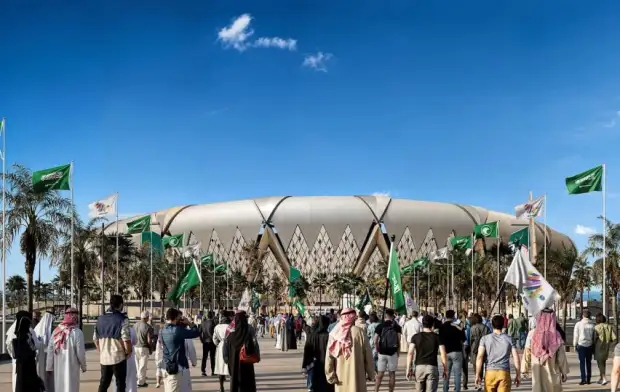The 2034 FIFA World Cup, set to take place in Saudi Arabia, could be brought forward by ten months to kick off in January, avoiding the extreme summer heat and coinciding with the Ramadan period.
Such a shift would drastically impact the global football calendar, including another disruption to the Premier League’s cherished Christmas fixture list, much like the adjustments made for Qatar’s winter tournament in 2022.
A Historic World Cup Decision
The official confirmation of Saudi Arabia as the host for the 2034 World Cup is expected at next week’s FIFA Congress. Representatives from FIFA’s 211 member associations will rubber-stamp both the 2030 and 2034 hosts. While the 2030 tournament will span Spain, Portugal, and Morocco—with its first three matches hosted in Uruguay, Argentina, and Paraguay—Saudi Arabia stands as the sole candidate for 2034, making its selection a formality.
The Challenges of a Summer World Cup
Although the event is currently scheduled for summer, Saudi Arabia’s scorching temperatures, often exceeding 45°C in June, make that timeline untenable for players, fans, and officials. A summer World Cup in such conditions poses significant health risks, even with advanced cooling technology.
Instead, a January start is gaining traction. This timing would not only avoid the Gulf state’s searing summer heat but also prevent potential clashes with Ramadan, a holy month observed by Muslims worldwide, during which fasting from sunrise to sunset is obligatory.
Advertisement
Latest Press Conference
We’re on Social Media



Navigating Around Ramadan
Ramadan in 2034 is expected to begin in March. If the tournament overlapped with the religious observance, it could present challenges for both athletes and fans. A January kickoff would respect Saudi Arabia’s cultural and religious priorities, while ensuring smooth scheduling for FIFA’s flagship event.
However, this adjustment would have a ripple effect on domestic and international football calendars, particularly in Europe. Clubs and leagues would face tight schedules to accommodate a mid-season tournament, as seen during the Qatar World Cup.
Implications for European Football
A January World Cup would compress the first half of the European domestic season. Boxing Day fixtures may become a symbolic finale to a congested pre-World Cup period, leaving teams scrambling to fit league matches and European competitions into a shortened timeline.
The Premier League, which already endured a seven-week hiatus during Qatar 2022, would likely face a similar disruption. UEFA competitions like the Champions League, Europa League, and Europa Conference League would also need to adapt their group stage schedules to align with the revised calendar.
Expanded Format Adds Complexity
The 2034 tournament, like its 2026 predecessor, will feature 48 teams and 104 matches over a footprint of at least 35 days. This expanded format, while offering fans more action, places additional strain on the global football calendar. A January-February tournament would require leagues to pause for up to seven weeks, a logistical headache for both clubs and broadcasters.
Saudi Arabia’s Ambitious Preparations
Saudi Arabia is leaving no stone unturned in its preparations for the event. The Kingdom has unveiled a dazzling array of stadiums, including the 92,000-capacity King Salman International Stadium in Riyadh. Other venues, spread across cities like Jeddah, Neom, and Abha, boast state-of-the-art designs and cutting-edge facilities.
From the King Abdullah Sports City Stadium in Jeddah to the futuristic New Murabba Stadium in Riyadh, Saudi Arabia’s infrastructure investment signals its intent to deliver a world-class tournament. These venues not only showcase architectural ambition but also underline the country’s commitment to hosting an unforgettable event.
Football’s Global Future
The move to shift the World Cup to January reflects FIFA’s growing emphasis on accommodating diverse cultural and climatic considerations. As football continues to expand its global footprint, such adjustments underscore the sport’s adaptability in meeting the needs of its hosts while preserving its universal appeal.
The Broader Impact
While a January World Cup solves immediate scheduling challenges, it further highlights the growing strain on players, clubs, and federations. Fixture congestion, increased travel demands, and shortened recovery periods are among the challenges that stakeholders must address.
However, this decision also represents an opportunity for Saudi Arabia to showcase its ambitions on a global stage, blending football’s universal appeal with the Kingdom’s unique culture and traditions.
As FIFA prepares to officially confirm Saudi Arabia’s hosting role, all eyes will turn to how the footballing world adjusts to what promises to be another groundbreaking tournament in the Gulf region.
